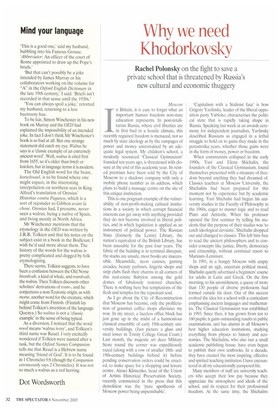Mind your language
'This is a good one,' said my husband, bubbling into his Famous Grouse. Abbreviator: An officer of the court of Rome appointed to draw up the Pope's briefs.'
'But that can't possibly be a joke intended by James Murray or his collaborators working on the volume for "A" in the Oxford English Dictionary in the late 19th century,' I said. 'Briefs isn't recorded in that sense until the 1930s.'
'You can always spoil a joke,' retorted my husband, returning to a less beetrooty hue.
To be fair, Simon Winchester in his new book on Murray and the OED had explained the impossibility of an intended joke. In fact! don't think Mr Winchester's book is so bad at all. But one strange statement did catch my eye. Walrus he says is a 'classic example of an extremely ancient word'. Well, walrus is cited first from 1655, so it's older than briefs or knickers, but in language terms it is modern.
The Old English word for the beast, horschwael, is to be found where one might expect, in the interesting interpolation on northern seas in King Alfred's translation of Orosius' Historiae contra Paganos, which is a sort of rejoinder to Gibbon avant la chose. Orosius had, I presume, never seen a walrus, being a native of Spain, and living mostly in North Africa.
Mr Winchester mentions that the etymology in the OED was written by J.R.R. Tolkien and that his notes on the subject exist in a book in the Bodleian; I wish he'd said more about them. The history of the words for the walrus is pretty complicated and dogged by folk etymologising.
There seems, Tolkien suggests, to have been a confusion between the Old Norse hrosshvalr, a kind of whale, and rosmhvalr, the walrus. Then Tolkien discounts other scholars' derivations of rosm-, and he conjectures a non-Teutonic origin, as with morse, another word for the creature, which might come from Finnish. (Finnish lay behind Tolkien's invention of the language Quenya.) So walrus is not a 'classic example' in the sense of being typical.
As a diversion, I noticed that the word rewel means 'walrus ivory', and Tolkien's third name was Reuel. I very excitedly wondered if Tolkien were named after a tusk, but the Oxford Names Companion tells me that Reuel is a Hebrew name meaning 'friend of God'. It is to be found in 1 Chronicles 9:8 (though the Companion erroneously says 2 Chronicles). It was not so much a walrus as a red herring.
Dot Wordsworth


































































































 Previous page
Previous page